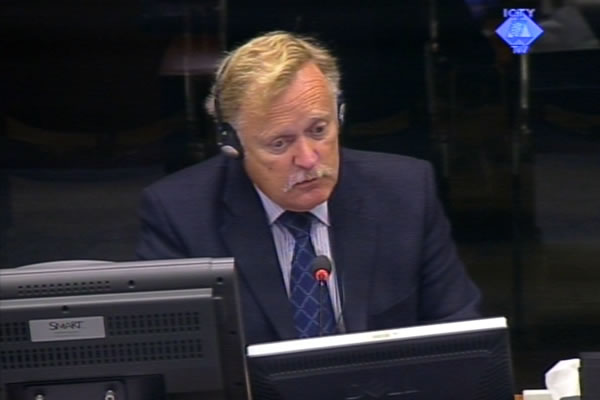Home
BLOCKING SARAJEVO TO ACHIEVE OBJECTIVES IN OTHER BATTLEFIELDS
Former senior UN military observer Richard Mole notes that Bosnian Serbs’ 'strategy was to block Sarajevo' and put pressure on the city in order to achieve their objectives in other battlefields. General Ratko Mladic has agreed that the trial proceed in his absence while he undergoes medical examinations
 Richard Mol, witness at the Ratko Mladic trial
Richard Mol, witness at the Ratko Mladic trial British lieutenant colonel Richard Mole started his testimony at the trial of the former VRS Main Staff commander Ratko Mladic today. Mole testifies about the three months he spent in Sarajevo as a senior UN military observer, from 16 September to 26 December 1992.
According to the summary of his evidence at the trials of Stanislav Galic and Radovan Karadzic, Mole was in charge of about 60 military observers deployed on both sides of the confrontation line. The mandate of the observers was to monitor the situation in Sarajevo and report on the use of heavy artillery. Mole confirmed that the Sarajevo-Romanija Corps shelled Sarajevo 'intensively, indiscriminately and randomly' and thus put 'heavy psychological pressure' on its citizens. Galic in turn threatened he would shell Sarajevo if the developments on other frontlines were to go against the Bosnian Serbs.
After three months in Sarajevo, Mole concluded that the Bosnian Serbs’ 'strategy was to close off the city and use force not justified by military necessity' in order to 'accomplish their objectives in other battlefields'. The prosecutor corroborated this with Radovan Karadzic's statement that “because of the operations in Sarajevo, there was no fighting in Krajina, Semberija, along the Drina River, in all areas where there might be conflicts with Muslims”. Mole said the statement was a 'revelation' to him because it corresponded with his assessment that the events in other places affected the situation in Sarajevo.
In the cross-examination, defense counsel Dragan Ivetic put it to the witness that the military observers were not there to count the shells, which is what they did in their reports. Mole confirmed it, insisting that the military observers made every effort to remain 'neutral, to interpret events and determine the truth about what happened’. The witness also confirmed that the SRK took over the Territorial Defense units and that it was very difficult to establish a joint chain of command in the local units. In Mole's view, that was 'a major difficulty' for both warring factions: it resulted in the local commanders 'going rogue’.
The defense counsel quoted Mole's evidence from Karadzic’s trial, where he said that Western media were biased, 'anti-Serb' and didn't always accurately report the intentions of the warring sides. This made it more difficult to pursue negotiations with the two sides because they would assume a 'tougher stance' and were less ready to compromise, Mole claimed. He gave an example of a journalist from the BBC who, Mole contended, published an 'invented story' from Sarajevo. Mole shared the journalist's name in closed session.
The defense counsel put it to the witness that the BH Army had heavy artillery deployed on positions on Mount Igman and could target any part of the city they chose. Mole confirmed that Serbs 'constantly complained that the Presidency troops would open fire from Mount Igman on civilian areas under Serb control’. This led to Galic’s threats that he would open fire on Sarajevo if this practice continued, Mole said.
The cross-examination of Richard Mole will resume tomorrow in Mladic’s absence. The accused has agreed that the trial continue in his absence. When the presiding judge allowed Mladic to leave the courtroom this morning, Mladic first saluted and then waved to the Trial Chamber, the witness and the audience in the public gallery.
Linked Reports
- Case : Mladic
- 2012-10-31 CHILDREN MASSACRED WHILE PLAYING IN THE SNOW
- 2012-10-29 TOO YOUNG TO SERVE IN THE ARMY, OLD ENOUGH TO KILL
- 2012-10-12 MLADIC COULD ORDER A CEASE FIRE IF HE WANTED
- 2012-11-02 LEGITIMATE MILITARY TARGETS IN SARAJEVO
- 2012-11-02 VENTING ANGER ON PRISONERS
- 2012-11-05 ISMET SVRAKA TESTIFIES FOR THE SECOND TIME AT THE TRIBUNAL
